|
|
|
|
|
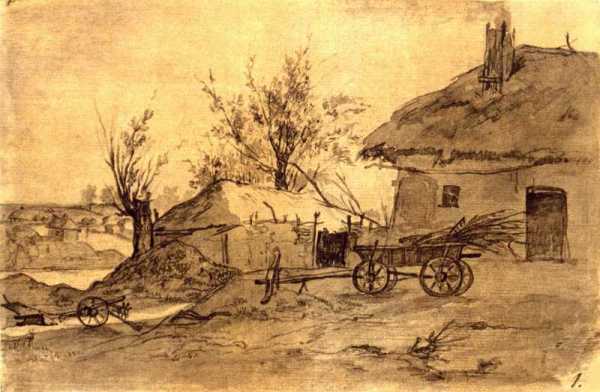
Taras Shevchenko. Peasant Barnyard. Water-colour. 1845.
|
Taras Shevchenko
THE HOUSEMAID
("U nedilyu vrantsi-rano
Pole vkrylosya tumanom..." /
"У неділю вранці-рано
Поле вкрилося туманом...")
Translated by Olga Shartse
Prologue
Early on a Sabbath day
Wrapped in mist the country lay.
On a mound, in mist enfolded,
To her breast a bundle holding,
Stood a woman, young and wistful
Like a poplar, in a whisper
Talking sadly to the mist:
“Mist, oh mist, do hear my plea,
Pity me in my ordeal!
Oh, why don’t you bury me,
Hide me in this lonely field?
Oh, why don’t you smother me,
Crush me so I would not breathe,
And my days of suffering
Thus make mercifully brief!
No, mist, no, don’t smother me,
With your cloak just cover me,
Hide me so my misery
None should know and none should see!
I’m not alone, I’ve left behind
My father and my mother.
I also have... I have, besides,
Oh mist! There is one other...
I have a son, a tiny child,
A soul unnamed and unbaptized!
It’s not I who’ll baptize you,
To my bitter, bitter woe,
It is strangers who’ll baptize you,
I will never even know
What they’ve called you, where to find you...
Oh, my cnild, my very own!
Do not curse me! I’ll "be praying -
God will hear a mother’s prayer,
Happiness He’ll send from heaven,
Fortune kind will be your share.”
Bowed in grief, she walked away
Through the mist with footsteps slow,
Singing tearfully a lay
Of a widow’s bitter woe
As she buried her two babes
In the Danube long ago:
‘There’s a grave mound on the plain,
There a widow came one day.
Poison grass she came to find,
Poison grass she did not find,
And her time was coming nigh.
In the field she had to lie.
Her two boys in cloth to bind,
And take them to the Danube wide.
’River, river, take my babes,
Rock them gently on your waves!
Yellow sand, with soft caress,
Feed my babies at your breast,
Sing to them a lullaby,
Cover them in peace to lie!”’
|
|
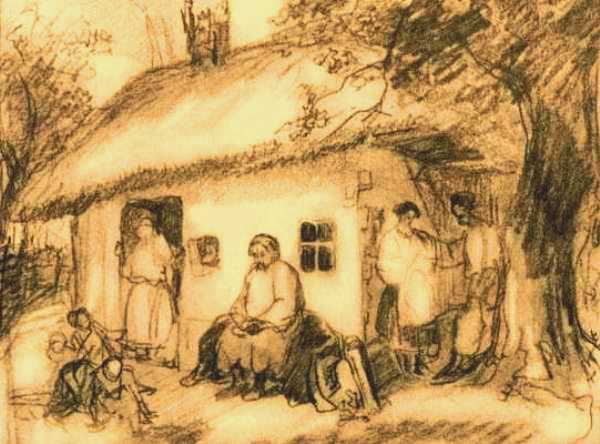
Taras Shevchenko. Peasant Family. Sketch. Pencil. 1843.
|
I
Beside the grove lived all their life
A kind old man and his good wife,
In their nice cottage near the pond,
Like children ever,
Always together.
They’d tended lambs as children young,
Grew up and married later on.
They bought a cow, and built a home,
A water mill then came to own,
An orchard planted by the grove,
And beehives not a few they got -
Of everything they had a lot.
But in their home there was no child,
And Death was nearing with his scythe!
Who’ll cherish them when they are old,
Who’ll be a loving son to them?
Who’ll say a prayer for their souls,
Who’ll mourn their passing, weep for them?...
Who other than their flesh and blood
In time their legacy will share
And think of them with gratitude,
Recall how good and kind they were?...
It’s hard to rear a brood of young
When you’ve no home to call your own,
But harder still to age alone
In mansion splendid, but forlorn.
To grow infirm and leave this world,
Your property bequeathed to none,
So utter strangers squander all,
Ungratefully, in careless fun.
|
|
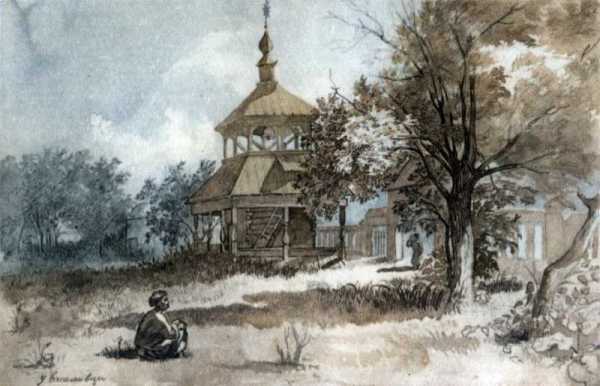
Taras Shevchenko. In Vasylivka. Water-colour. 1845.
|
II
The couple, on the day of rest,
Were sitting in their Sunday best
Upon a bench beneath the trees.
The sun was shining. Not a breeze,
No wisp of cloud the blue disturbed,
‘Twas like a paradise on earth.
But, like a beast in forest murk,
Deep in their hearts a sadness lurked.
Why sorrow in this heaven fair,
What more could these good people want?
Perhaps some grief of yester-year
Had ‘wakened now their peace to haunt?
Was it some hurt of long ago
That stirred again their hearts to pain?
Or some new trouble just arose
This paradise to set aflame?
What is the cause of their despair?
Perhaps they grieve because they know
That soon to God they must repair,
And there is nobody to care,
To hitch their horses for the road...
“Oh, who will lay us in our graves?”
And Nastya answered: “I can’t say.
It’s had me worried all my days,
It hurts to think we’ve reached old age
And we’ve no one our hearts to cheer...
For whom then did we scrape and save
All this... But listen, do you hear?
There’s someone crying, seems to me...
Sounds like a baby... It’s quite near!
Let’s go and see what it can be,
Come on, let’s hurry. Hear it? Hear?”
And off they hurried to the gate
Whence came the piteous, plaintive sound.
And there they stopped ana silent gazed.
A baby lay upon the ground
Beside the fence. The bundle wee
Was loosely wrapped, but o’er it lay
A new warm coat. ’Twas plain to see
It was the mother who had laid
Her baby here, and lovingly
Had o’er it spread her only coat!
Trokhim ana Nastya stood bedazed
And whispered prayers, while the babe
As though ‘twas pleading for their care,
Had freed its tiny arms and stretched
Them up towards the ageing pair.
And now the mite no longer cried,
Just gave a whimper, soft and weak.
"Wake up, Nastya, can’t you speak?
Here’s our answer, don’t you see?
Here’s our fortune and delight,
You and I have got a son!
Take the baby, mother him...
Hope the day’s a lucky one!
Take him in, and I will go
And invite the sponsors."
Verily, how strange the things
That occur among us!
Here one curses his own son,
Driving him from house and home;
Others, parenthood denied,
Work their fingers to the bone
Candles for the church to buy,
Day and night they pray the saints -
All in vain!... Indeed, the things
Happening on this earth are strange!
|
|
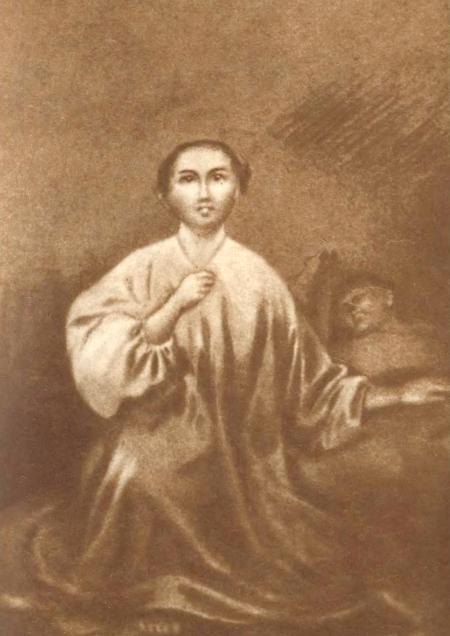
Taras Shevchenko. Mother, at Prayer. Sepia. 1853.
|
III
Not just two, but six godparents
Gladly to the christening came.
That same night the child was christened,
Marko was his given name.
Marko grew. Trokhim and Nastya
Simply doted on the boy,
Fussing over him and bustling
In anxiety and joy.
In a year the child grew lusty,
And the milch-cow for his sake
Lived in clover, as we say.
Then, a woman came one day,
Very young and full of grace,
Dark of brow and fair of face,
Seeking work as housemaid
In this happy blessed place.
“Nastya, should we take her, eh?”
“Yes, Trokhim, I think we should.
We are old and often ail,
Then there’s little Marko, too.
True, the baby’s big and strong,
Still he needs an able nurse,
He wants care the whole day long.”
“Yes, indeed, our Marko does.
Also, I have trod the earth
Long enough, I think. And now,
Daughter, let us come to terms.
You’ll want yearly pay, or how?”
“I’ll take anything you say.”
“No, my girl, that’s not the way!
You must care about your pay,
It’s your honest, hard earned pay.
Those who don’t, will always stay
With a sadly empty purse.
Do it this way: try it out,
And we’ll all see now it works.
You don’t know us or our ways,
We don’t know you and can’t tell
If we’re suited. Of your wage
We shall talk another time.
All right, daughter?” “Very well.”
“We’re agreed then. Come inside.”
That settled it. The housemaid
Was so excited and elate
That one would think a prince she’d wed
Or come into a rich estate.
While working hard from dawn till dark
Both in the house and the yard,
She sang as happy as a lark.
To mind the child she never tired,
With motherly and loving care.
She washed and combed his silky hair,
And dressed him up each blessed day
As if it were a holiday.
She played with him, and made him toys,
And sang him songs; it was her joy
On holidays, the whole day long,
To fuss around the darling boy.
Trokhim and Nastya watcned her ways
And blessed the day she came to them.
They could not know that their poor maid,
To endless sleepless nights condemned,
Was cursing her misfortune cruel
As she lay sobbing in her bed.
But no one heard it, no one knew it,
Nobody saw the tears she shed,
No, no one but the little babe.
The little one he could not know
Why ‘twas his nurse, their housemaid,
So wept in anguish over him.
Nor could he know, of course, what made
Her kiss him so and fondle him,
And why the sweetest bits she laid
With loving care aside for him,
Nor why, if in the dead of night
He stirred in sleep or even turned,
At once she’d be there at his side
With truly motherly concern
To bless him, put his covers right,
And lull him with a gentle croon.
Why ‘twas she heardnis breathing light
While sleeping in another room.
And Marko, waking in the morn,
His baby arms stretched out to her,
And called her Mother, needing her,
His Hanna who was always there....
He did not know. Thus Marko grew
To man’s estate without a care.
|
|
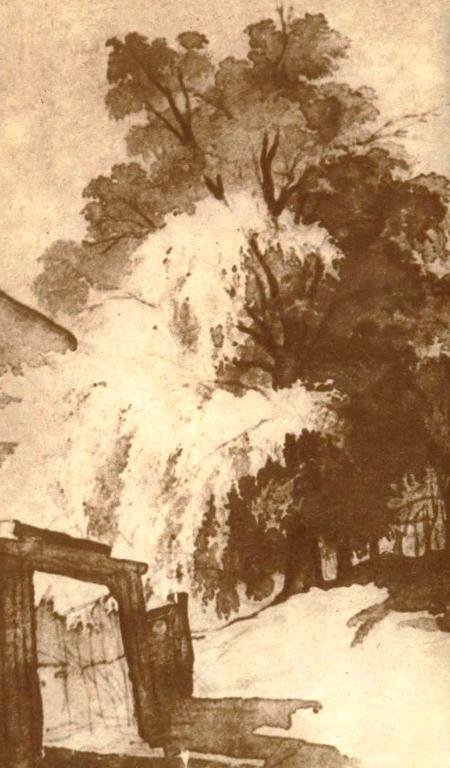
Taras Shevchenko. Vasilkiv Fort in Kiev. Detail. 1846.
|
IV
The years rolled ever on and on,
Much water ‘neath the bridge had run.
Death also visited this home,
And sorrow brought to everyone.
Old Nastya’s fateful end had come.
And poor Trokhim all but succumbed.
Accurst misfortune took its own,
And then it left them well alone.
And blessedness once more returned
From ‘yond the woods, where it had flown,
To settle down in Trokhim’s home.
Marko drives a cart to town,
Autumn nights he never now
Spends at home, asleep in bed...
It was time the boy was wed.
“Whom should we take?” thought old Trokhim,
And then asked Hanna, faithful maid,
For her advice. She’d have been glad
To pick for Marko as a mate
A princess royal! “Let’s ask him,
Let Marko tell us whom he’d wed.”
“So be it. Let us speak to him,
And after that we’ll go ahead.”
And so they did. A fitting match
For Marko had to be arranged.
Matchmakers went and soon came back
And brought the bread they had exchanged
With parents of the bride-to-be.
She was both young and dignified,
And beautiful, and dressed so fine
A hetman surely wouldn’t mind
To be her groom. She was indeed
A very wonder of a bride!
“I thank you kindly,” said Trokhim.
“And now the date we must release,
Tell all the folks so they will know
Just when the wedding feast will be.
There’s only one thing worries me:
Who will our Marko’s mother be?
My Nastya hasn’t lived to see...”
Trokhim could not go on for tears.
And in the doorway Hanna stood,
Their servant woman all those years,
The door-post gripping lest she swoon,
She could not make a move or speak
And only whispered brokenly:
“Ah, who, who’ll Marko’s mother be?”
|
|
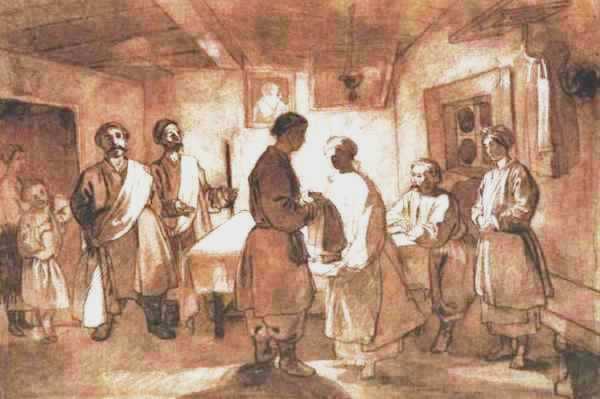
Taras Shevchenko. Match-Makers. Pencil and sepia. 1844.
|
V
Very soon the matrons came
To Trokhim’s to bake the cake
For the wedding. Old Trokhim,
Bravely mastering the shakes,
Danced with all tne fair young wives,
Laughed and joked, then went outside,
Swept the yard and gladly hailed
All those walking past his gate
To come in and taste his ale,
At the wedding be his guests.
Though unsteady on his legs,
On he bustled, none the less.
All were laughing, noisy, gay,
Both inside tne house and out.
From the cellars where they lay
Kegs of wine came rolling out.
All were busy cooking, baking.
Scrubbing, cleaning all around...
Strangers all. But where is Hanna?
Hanna’s gone to Kiev town.
Though Trokhim had begged her stay.
In his mother’s place to sit
Tearfully had Marko prayed.
“Marko, no it isn’t fit
That I take your mother’s place.
All your friends are well-to-do,
And I’m just a housemaid,
They would only laugh at you.
May the Lord guard over you:
To the shrines in Kiev town
I must go and pray the saints.
Then I will return to you,
If you’ll have me back again.
While I’ve strength left in my limbs
I shall work...” with feeling deep
She told Marko, blessing him
From her heart. Her tears ran free
As she left him at the gate.
The wedding feast was in full swing,
Musicians played, heels tapped away,
All hard at work. The tables groaned
With food and wine and home-brewed ale.
While Hanna, footsore, hurried on
To Kiev at the shrines to pray.
She got to town and straightaway,
Before she stopped to rest or sleep,
She sought a place where she could stay
And fetching water earn her keep,
Saving from her meagre pay
For St. Barbara’s holy day.
Pail she carried after pail,
And some kopecks eight she saved.
At the shrine of John the Martyr
In the ancient Kiev caves
Hanna bought a cap for Marko
So his head should never ache;
At St. Barbara’s shrine she bought
Marko’s wife a ring to wear.
Then she prayed the saints once more,
Crossed herself, and home repaired.
Marko and his lovely bride
Hurried out to meet her
At the gate, took her inside,
At the table seated,
Pressing food on her, the while
Listening to Hanna’s tale.
And when night came, Katerina
Bade her in tne front room stay.
“No, I don’t deserve such love.
Why do they respect me so?
Oh my Lordf in Heav’n above,
Surely it can’t be they know?
Have they guessed perhaps, and they...
No, they haven’t, they’re just kind,
They’re just good....”
The hired maid
Wept and tossed all through the night.
|
|
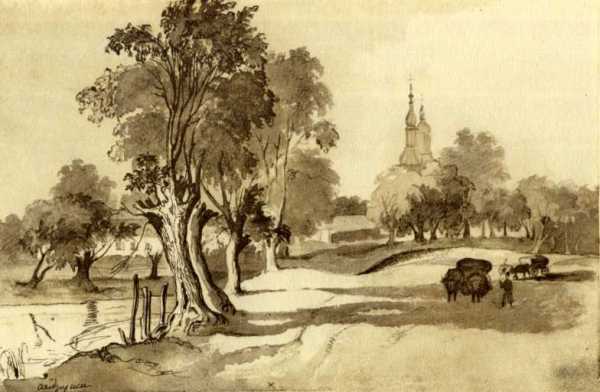
Taras Shevchenko. Andrushi. Sepia. 1845.
|
VI
Thrice the pond was frozen tight,
Thrice again it melted down,
Thrice Kat’rina saw old Hanna
Off to holy Kiev town
Like a daughter. And again
She saw Hanna on the way
For the fourth time; to the mound
Walked with her, and begged and prayed
That she should not tarry long,
For their happy, blessed home
Would seem cheerless and forlorn
With their loving mother gone.
One Sunday, following Assumption,
Trokhim dressed in his best white shirt
Was basking in the pleasant sunshine
In great content. Before him romped
His little grandson with his pup,
There, too, his baby sister now.
All dressed up in her mother’s skirt.
Came calling on Grandpa. She bowed
As matrons do. Trokhim played up
And welcomed her with face kept straight:
“What happened to the loaf you’d baked?
P’raps in the forest you were robbed,
Or else forgotten it at home?
Or never had one baked to bring?
Oh shame, oh shame! But look who’s come!”
Why, it was Hanna walking in!
The two young children and Trokhim
All ran to meet her at the gate.
“Where’s Marko? Is he not yet home?”
She asked in great anxiety.
Trokhim replied: “He still is gone.”
And Hanna said: “I thought my feet
Would never, never get me home.
I didn’t want to die out there.
In strange surroundings, all alone.
If I could last till he comes back...
My heart’s so heavy and so grieved!”
And then she took out of her bag
The gifts she brought for them from Kiev:
Little crosses, holy medals,
A string of beads for young Irene,
An icon framed in silver foil,
The nicest icon ever seen.
She had a whistle for the boy,
Toy horses too, a jolly pair;
For Marko’s wife a ring once more,
Kat’rina’s fourth that sne’d bought there
In Kiev’s shrines; and last of all
Three slender candles for Trokhim
Blessed at the church. And as for Marko,
This time there was no gift for him
Or for herself: her money spent,
She had no strength more pails to fetch,
She felt so ill, and home she went.
“Here’s half a roll that I have left,
Come, share it, children,” Hanna said,
And gave a little piece to each.
|
|
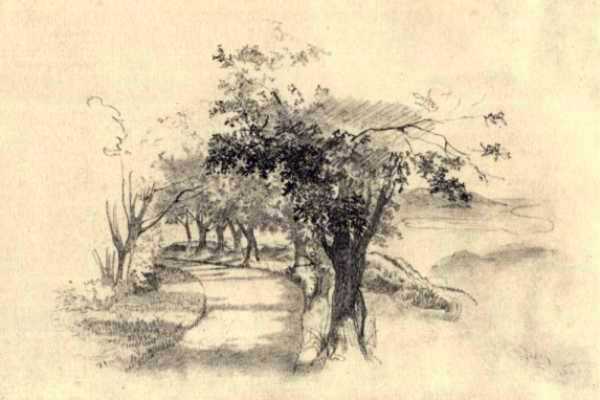
Taras Shevchenko. In Kiev (2). Pencil. 1843.
|
VII
In they went, and Katerina
Bathed old Hanna’s weary feet
And invited her to dinner,
But she couldn’t drink or eat.
She said: “Tell me, Katerina,
When is Sunday, I forget.”
“This is Friday”. “Then, my dear,
Sunday have a service sung
To St. Nicholas the healer,
Just in case there’s something wrong.
Why does Marko take so long!
God forbid that he should sicken
On a distant road somewhere.”
And the servant, old and stricken,
Burst out crying in despair.
Slowly, on the table leaning,
Hanna got up to her feet.
“I am ailing, Katerina.
I’m not well, I feel so weak,
I can hardly stand alone.
It’s bitter dying in a home
That’s blest and warm, but not your own...”
She was very, very bad,
Though the Eucharist she took,
Extreme unction, too, she had,
Nothing seemed to do her good.
Old Trokhim about the place
Like a lost soul wandered,
And a daughter couldn’t be
Than Kat’rina fonder.
Day and night she hovered near,
Always there at Hanna’s side.
But the hooting of the barn owls
In the silence of the night
Boded grief to come. And Hanna
Fretted every waking hour,
Every minute of the day.
“Oh, my daughter Katerina,
Why is Marko still away?
If I knew that it was fated
That I’d see him if I waited,
I would wait until he came.”
|
|
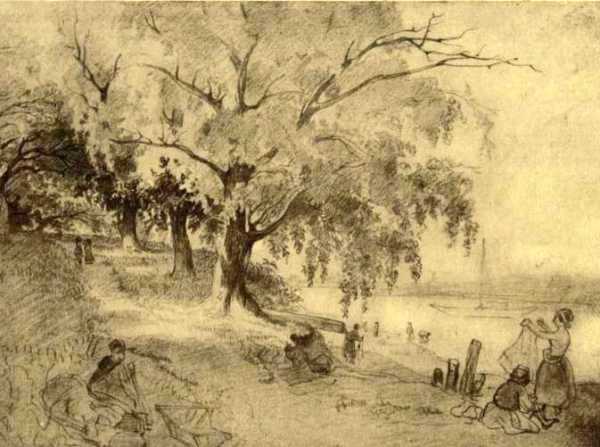
Taras Shevchenko. In Kiev. Etude. Pencil. 1843.
|
VIII
With the ox-cart drivers’ train
Homeward bound is Marko now.
Leisurely they make their way,
Resting while the oxen browse.
Marko's gift for Katerina
Is a length of splendid cloth,
And a red silk sash he’s bringing
For his Dad to cut a swath.
For their faithful housemaid
There’s a white-fringed shawl to wear,
And a piece of gold brocade
For a cap to hide her hair.
Fancy boots he’s bought the children,
Lots of figs and raisins sweet,
And some good old wine in Tsargrad
All of them to give a treat.
There’s a barrel of it there,
And some caviar from the Don.
Gifts he’s bringing, unaware
Things are what tney are at home.
On he drives without a care.
Thank the Lord he has arrived!
At the gate he says a prayer,
Opens it and throws it wide.
“Katerina, I could swear
I heard somebody arrive!
Marko’s come. Go quickly, daughter,
Hurry, bring him right inside!
Thank Thee, Jesus Christ Our Saviour,
That my tryst I’ve lived to keep!”
And she whispered the Lord’s Prayer,
Softly, softly, as in sleep.
Old Trokhim unhitched the oxen.
Put away the shaft and pin,
While Kat’rina welcomed Marko,
Feasted loving eyes on him.
“Where is Hanna, Katerina?
She’s not dead now, surely?”
“She’s not dead, but she is near it,
Hanna’s very poorly.
While your father’s busy here
With the oxen, Marko,
Let us go to her, my dear,
Ease her awful heartache.”
Marko walked into the room.
On the threshold stopped, aghast.
Hanna whispered in the gloom:
“Thank the Lord, he’s here at last!
Come close, Marko, don’t be frightened.
Leave us two, my daughter dear,
There is something I must ask him,
Something Marko’s got to hear.”
Softly walked out Katerina.
Marko, grieved and smitten,
Bent down close to Hanna’s pillow.
“Marko,” she said, “listen.
Look at me, look very closely,
See how near the end I’ve come...
I am not your servant, Marko,
I’m....” But she could not go on.
Marko gazed at her and wondered.
Hanna raised her eyes again,
At his face she looked intently
Then to sobs and tears gave way.
“Please forgive me! How I suffered
All my life... no home my own....
Please forgive, forgive me, Marko!
I’m your mother.... Marko... son.”
She fell silent.
He stood swaying
As the whole world heaved.
He came to... “Oh mother, mother!”
She no longer breathed.
|
|
Taras Shevchenko, poem "The Housemaid"
"Naymychka" (Наймичка"), поема
("U nedilyu vrantsi-rano pole vkrylosya tumanom..." /
"У неділю вранці-рано поле вкрилося туманом...")
Pereyaslav, November 13, 1845.
Translated by Olga Shartse *
* Shartse Olga - translator, editor, ed, author.
She has: 113 works in 234 publications in 2 languages and 2,508 library holdings.
Genres: Fiction, Novels, Satire, Psychological fiction, Satirical literature, Picaresque fiction, Humorous fiction, Short stories, Criticism, Interpretation, Political fiction etc.
Ukrainian folk tales (book ): 1 edition published in 1974 in English and held by 103 WorldCat member libraries worldwide. These tales carry a moral : a good deed is generously rewarded, the wicked are severely punished.
Source:
Taras Shevchenko. Selected poetry. Kiev, "Dnipro", 1977, p. 161 - 185.
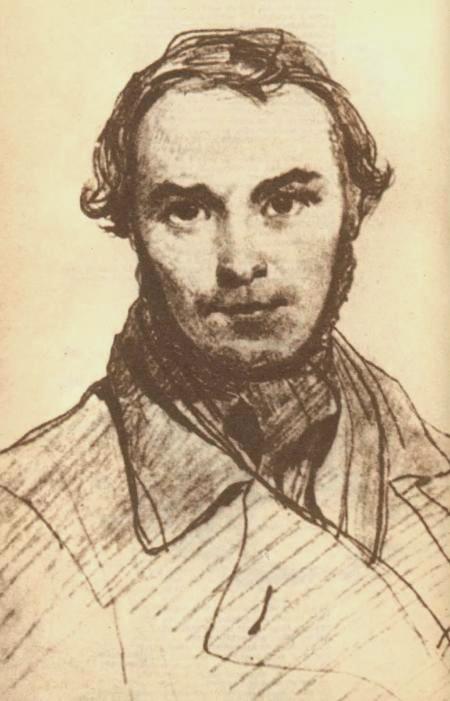
Taras Shevchenko. Self-Portrait. Pencil. 1845.
Original publication:
Taras Shevchenko. Zibrannia tvoriv: U 6 t. — K., 2003. — T. 1:
Poeziia 1837-1847. — S. 329 - 342, 730 - 730.
|
Тарас Шевченко
НАЙМИЧКА
Поема
Пролог
У неділю вранці-рано
Поле вкрилося туманом.
У тумані на могилі,
Як тополя, похилилась
Молодиця молодая.
Щось до лона пригортає
Та з туманом розмовляє:
— Ой, тумане, тумане,
Мій латаний талане!
Чому мене не сховаєш
Отут серед лану?
Чому мене не задавиш,
У землю не вдавиш?
Чому мені злої долі,
Чом віку не збавиш?
Ні, не дави, туманочку!
Сховай тільки в полі,
Щоб ніхто не знав, не бачив
Моєї недолі!..
Я не одна: єсть у мене
І батько і мати...
Єсть у мене... туманочку,
Туманочку, брате!!.
Дитя моє, мій синочку,
Нехрещений сину!
Не я тебе хреститиму
На лиху годину.
Чужі люди хреститимуть,
Я не буду знати,
Як і зовуть... Дитя моє!
Я була багата...
Не лай мене! Молитимусь,
Із самого неба
Долю виплачу сльозами
І пошлю до тебе! —
Пішла полем, ридаючи,
В тумані ховалась
Та крізь сльози тихесенько
Про вдову співала,
Як удова в Дунаєві
Синів поховала:
«Ой у полі могила;
Там удова ходила, —
Там ходила, гуляла,
Трути-зілля шукала.
Трути-зілля не найшла,
Та синів двох привела,
В китаєчку повила
І на Дунай однесла:
— Тихий, тихий Дунай!
Моїх діток забавляй.
Ти, жовтесенький пісок,
Нагодуй моїх діток!
І скупай, і сповий,
І собою укрий!»
І
Був собі дід та баба.
З давнього давна, у гаї над ставом
Удвох собі на хуторі жили,
Як діточок двоє,
Усюди обоє.
Ще змалечку удвох ягнята пасли,
А потім побрали'ся,
Худоби діждалися, —
Придбали хутір, став і млин.
Садок у гаї розвели
І пасіку чималу —
Всього надбали.
Та діточок у їх бігма,
А смерть з косою за плечима.
Хто ж їх старість привітає,
За дитину стане?
Хто заплаче, поховає,
Хто душу спом'яне?
Хто поживе добро чесно
В добрую годину
І згадає, дякуючи,
Як своя дитина?..
Тяжко дітей годувати
У безверхій хаті,
А ще гірше старітися
У білих палатах,
Старітися, умирати,
Добро покидати
Чужим людям, чужим дітям
На сміх, на розтрату!
II
І дід і баба у неділю
На призьбі вдвох собі сиділи
Гарненько, в білих сорочках.
Сіяло сонце; в небесах
Ані хмариночки; та тихо
Та любо, як у раї.
Сховалося у серці лихо, —
Як звір у темнім гаї.
В такім раї чого б, бачся,
Старим сумувати?
Чи то давнє яке лихо
Прокинулось в хаті?
Чи вчорашнє, задавлене
Знов поворушилось?
Чи ще тільки заклюнулось
І рай запалило?
Не знаю, що і після чого
Старі сумують. Може, вже
Оце збираються до бога,
Та хто в далекую дорогу
Їм добре коней запряже?
— А хто нас, Насте, поховає,
Як помремо? — Сама не знаю!
Я все оце міркувала,
Та аж сумно стало:
Одинокі зостарілись...
Кому понадбали
Добра сього?.. — Стривай лишень!
Чи чуєш? Щось плаче
За ворітьми, мов дитина!
Побіжім лиш... Бачиш —
Я вгадував, що щось буде! —
І разом схопились,
Та до воріт... Прибігають —
Мовчки зупинились.
Перед самим перелазом
Дитина сповита —
Та й не туго й новенькою
Свитиною вкрита.
Бо то мати сповивала —
І літом укрила
Останньою свитиною!..
Дивились, молилис
Старі мої. А сердешне
Неначе благає:
Випручало рученята
Й до їх простягає
Манюсінькі... і замовкло,
Неначе не плаче,
Тільки пхика.
— А що. Насте?
Я й казав... От бачиш!
От і талан, от і доля,
І не одинокі!
Бери ж лишень та сповивай...
Ач, яке, нівроку!
Неси ж в хату, а я верхи
Кинусь за кумами
В Городище... —
Чудно якось
Діється між нами!
Один сина проклинає,
З хати виганяє,
Другий свічечку, сердешний,
Потом заробляє
Та, ридаючи, становить
Перед образами —
Нема дітей!.. Чудно якось
Діється між нами!
III
Аж три пари на радощах
Кумів назбирали
Та ввечері й охрестили,
І Марком назвали.
Росте Марко; старі мої
Не знають, де діти,
Де посадить, де положить
І що з ним робити.
Минає рік. Росте Марко —
І дійна корова
У розкоші купається.
Аж ось чорноброва
Та молода, білолиця
Прийшла молодиця
На той хутір благодатний
У найми проситься.
— А що ж, каже, возьмім, Насте!
— Возьмімо, Трохиме,
Бо ми старі, нездужаєм,
Та таки й дитина.
Хоч воно вже й підросло,
Та все ж таки треба
Коло його піклуватись.
— Та воно-то треба,
Бо я й свою вже часточку
Прожив, слава богу, —
Підтоптався. Так що ж тепер,
Що візьмеш, небого?
За рік, чи як? — А що дасте.
— Е, ні! Треба знати,
Треба, дочко, лічить плату,
Зароблену плату.
Бо сказано: хто не лічить,
То той і не має.
Так отак хіба, небого:
Ні ти нас не знаєш,
Ні ми тебе; а поживеш,
Роздивишся в хаті,
Та й ми тебе побачимо —
Отоді й за плату.
Чи так, дочко? — Добре, дядьку.
— Просимо ж у хату. —
Поєднались. Молодиця
Рада та весела;
Ніби з паном повінчалась,
Закупила села!
І у хаті, і на дворі,
І коло скотини —
Увечері, і вдосвіта;
А коло дитини —
Так і пада, ніби мати,
В будень і в неділю
Головоньку йому змиє
Й сорочечку білу
Що день божий, надіває;
Грається співає,
Робить возики; а в свято —
То й з рук не спускає.
Дивуються старі мої
Та моляться богу...
А наймичка невсипуща
Щовечір, небога,
Свою долю проклинає,
Тяжко, важко плаче;
І ніхто того не чує,
Незнає й не бачить,
Опріч Марка маленького.
Так воно не знає,
Чого наймичка сльозами
Його умиває.
Не зна Марко, чого вона
Так його цілує,
Сама не з'їсть і не доп'є —
Його нагодує.
Не зна Марко. Як в колисці
Часом серед ночі
Прокинеться, ворухнеться, —
То вона вже скочить,
І укриє, й перехрестить,
Тихо заколише —
Вона чує з тії хати,
Як дитина дише.
Вранці Марко до наймички
Ручки простягає
І мамою невсипущу
Ганну величає...
Не зна Марко. Росте собі,
Росте, виростає.
IV
Чимало літ перевернулось,
Води чимало утекло.
І в хутір лихо завернуло,
І сльоз чимало принесло.
Бабусю Настю поховали
І ледве, ледве одволали
Трохима діда. Прогуло
Прокляте лихо та й заснуло —
На хутір знову благодать
З-за гаю темного вернулась
До діда в хату спочивать.
Уже Марко чумакує
І восени не почує
Ні під хатою, ні в хаті, —
Кого-небудь треба сватать!
— Кого ж би тут? — старий дума
І просить поради
У наймички. А наймичка
До царівни б рада
Слать старости: — Треба Марка
Самого спитати.
— Добре, дочко, спитаємо
Та й будемо сватать. —
Розпитали, порадились,
Та й за старостами
Пішов Марко. Вернулися
Люди з рушниками,
З святим хлібом обміненим.
Панну у жупані,
Таку кралю висватали,
Що хоч за гетьмана,
То не сором. Отаке-то
Диво запопали.
— Спасибі вам! — старий каже. —
Тепер, щоб ви знали,
Треба краю доводити,
Коли й де вінчати,
Та й весілля. Та ще ось що:
Хто в нас буде мати?
Не дожила моя Настя!.. —
Та й заливсь сльозами.
А наймичка у порогу
Вхопилась руками
За одвірок та й зомліла.
Тихо стало в хаті;
Тільки наймичка шептала:
— Мати... мати... мати...
V
Через тиждень молодиці
Коровай місили
На хуторі. Старий батько
З усієї сили
З молодицями танцює,
Та двір вимітає,
Та прохожих, проїжджачих
У двір закликає,
Та вареною частує,
На весілля просить.
Знай бігає — а самого
Ледве ноги носять.
Скрізь гармидер та реготня,
В хаті і надворі.
І жолоби викотили
З нової комори.
Скрізь порання: печуть, варять,
Вимітають, миють...
Та все чужі. Де ж наймичка?
На прощу у Київ
Пішла Ганна. Благав старий,
А Марко аж плакав,
Щоб була вона за матір.
— Ні, Марку! Ніяко
Мені матір'ю сидіти:
То багаті люди,
А я наймичка... Ще й з тебе
Сміятися будуть. —
Нехай бог вам помагає!
Піду помолюся.
Усім святим у Києві,
Та й знову вернуся
В вашу хату, як приймете.
Поки маю сили,
Трудитимусь... — Чистим серцем
Поблагословила
Свого Марка... Заплакала
Й пішла за ворота.
Розвернулося весілля,
Музикам робота —
І підковам. Вареною
Столи й лави миють.
А наймичка шкандибає,
Поспішає в Київ.
Прийшла в Київ — не спочила,
У міщанки стала,
Найнялася носить воду,
Бо грошей нестало
На молебствіє Варварі.
Носила, носила,
Кіп із вісім заробила
Й Маркові купила
Святу шапочку в пещерах
У Йвана святого,
Щоб голова не боліла
В Марка молодого.
І перстеник у Варвари
Невістці достала,
І, всім святим поклонившись,
Додому верталась.
Вернулася. Катерина
І Марко зустріли
За ворітьми, ввели в хату
Й за стіл посадили;
Напували й годували,
Про Київ питали,
І в кімнаті Катерина
Одпочить послала.
— За що вони мене люблять?
За що поважають?
О боже мій милосердний,
Може, вони знають...
Може, вони догадались...
Ні, не догадались —
Вони добрі... — І наймичка
Тяжко заридала.
VI
Тричі крига замерзала,
Тричі розтавала,
Тричі наймичку у Київ
Катря провожала,
Так, як матір. І в четвертий
Провела небогу
Аж у поле, до могили,
І молила бога,
Щоб швиденько верталася,
Бо без неї в хаті
Якось сумно — ніби мати
Покинула хату.
Після пречистої в неділю,
Та після першої, Трохим
Старий сидів в сорочці білій,
В брилі, на призьбі. Перед ним
З собакою онучок грався,
А внучка в юпку одяглась
У Катрину і ніби йшла
До діда в гості. Засміявсь
Старий і внучку привітав,
Неначе справді молодицю:
— А де ж ти діла паляницю?
Чи, може, в лісі хто одняв?
Чи попросту — забула взяти?
Чи, може, ще й не напекла?
Е, сором, сором! Лепська мати! —
Аж зирк — і наймичка ввійшла
На двір. Старий побіг стрічати
З онуками свою Ганну...
— А Марко в дорозі? —
Ганна діда питалася.
— В дорозі ще й досі.
— А я ледве додибала
До вашої хати,
Не хотілось на чужині
Одній умирати.
Коли б Марка діждатися...
Так щось тяжко стало! —
І внучатам із клуночка
Гостинці виймала —
І хрестики, й дукачики,
Й намиста разочок
Яриночці, і червоний
З фольги образочок,
А Карпові соловейка
Та коників пару,
І четвертий уже перстень
Святої Варвари
Катерині. А дідові
Із воску святого
Три свічечки; а Маркові
І собі нічого
Не принесла, не купила,
Бо грошей нестало,
А заробить не здужала.
— А ось ще осталось
Півбубличка! — Й по шматочку
Дітям розділила.
VII
Ввійшла в хату. Катерина
Їй ноги умила
Й полуднувать посадила.
Не пила й не їла
Стара Ганна. — Катерино!
Коли в нас неділя? —
— Післязавтра. — Треба буде
Акафіст найняти
Миколаєві святому
Й на часточку дати;
Бо щось Марко забарився...
Може, де в дорозі
Занедужав, сохрань боже! —
Й покапали сльози
З старих очей замучених,
Ледве, ледве встала
Із-за стола. — Катерино!
Не та вже я стала:
Зледащіла, не здужаю
І на ноги встати.
Тяжко, Катре, умирати
В чужій теплій хаті.
Занедужала небога.
Уже й причащали,
Й малосвятіє служили, —
Ні, не помагало!
Старий Трохим по надвір'ю,
Мов убитий, ходить.
Катерина ж з болящої
І очей не зводить.
Катерина коло неї
І днює й ночує.
А тимчасом сичі вночі
Недобре віщують —
На коморі. Болящая
Щодень, що година
Ледве чути питається:
— Доню Катерино!
Чи ще Марко не приїхав?
Ох, якби я знала,
Що діждуся, що побачу,
То ще б підождала.
VIII
Іде Марко з чумаками;
Ідучи співає.
Не поспіша до господи —
Воли попасає.
Везе Марко Катерині
Сукна дорогого,
"А батькові шитий пояс
Шовку червоного.
А наймичці на очіпок
Парчі золотої
І червону добру хустку
З білою габою.
А діточкам черевички,
Фіг та винограду.
А всім вкупі — червоного
Вина з Цареграду
Відер з троє у барилі,
І кав'яру з Дону, —
Всього везе, та не знає,
Що діється дома.
Іде Марко, не журиться.
Прийшов — слава богу!
І ворота одчиняє,
І молиться богу...
— Чи чуєш ти, Катерино?
Біжи зустрічати!
Уже прийшов. Біжи швидше,
Швидше веди в хату!..
Слава тобі, Христе боже!
Насилу діждала! —
І «отче наш» тихо... тихо,
Мов крізь сон, читала.
Старий воли випрягає,
Занози ховає
Мережані. А Катруся
Марка оглядає.
— А де ж Ганна, Катерино?
Я пак і байдуже.
Чи не вмерла? — Ні, не вмерла,
А дуже нездужа.
Ходім лишень в малу хату,
Поки випрягає
Воли батько; вона тебе,
Марку, дожидає. —
Ввійшов Марко в малу хату
І став у порогу...
Аж злякався. Ганна шепче:
— Слава... слава богу.
Ходи сюди, не лякайся...
Вийди, Катре, з хати:
Я щось маю розпитати,
Дещо розказати. — .
Вийшла з хати Катерина,
А Марко схилився
До наймички у голови.
— Марку! Подивися,
Подивися ти на мене!
Бач, як я змарніла.
Я не Ганна, не наймичка,
Я... — Та й оніміла.
Марко плакав, дивувався.
Знов очі одкрила,
Пильно, пильно подивилась —
Сльози покотились.
— Прости мене. Я каралась
Весь вік в чужій хаті...
Прости мене, мій синочку!
Я... я твоя мати. —
Та й замовкла... Зомлів Марко,
Й земля задрижала.
Прокинувся... до матері —
А мати вже спала.
(1845, Переяслав)
|
|
За матеріалами: Тарас Шевченко. Зібрання творів у 6 томах. Київ, "Наукова думка", 2003. Том 1: Поезія 1837 - 1847, стор. 329 - 342, 730 - 733.
Read more:
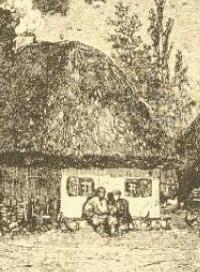 Taras Shevchenko, poem "Naimechka or The Servant" Taras Shevchenko, poem "Naimechka or The Servant"
"Naymychka" (Наймичка"), поема
("U nedilyu vrantsi-rano pole vkrylosya tumanom..." /
"У неділю вранці-рано поле вкрилося туманом...")
Pereyaslav, November 13, 1845.
Translated by Alexander Jardine Hunter
Споріднені публікації, за тегами:
|
|
|
|
|
|










